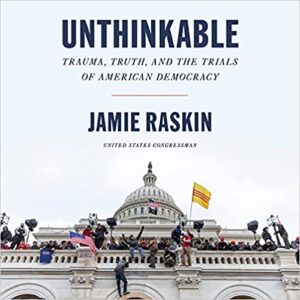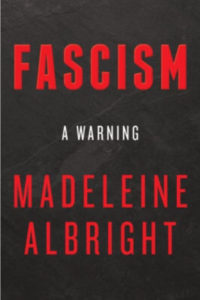fascism
Wednesday, March 23rd, 2022
March 23, 2022Matthew Fox
‘We had (have) chosen a path of domination and destruction, of power-over instead of power-with, of wars and enslavement of African peoples and other reptilian games, of patriarchy and its distorted values, of rugged individualism and the survival of the fittest, rather than a path of interdependence and compassion, of gender balance and respect, of eco- and racial and economic justice. The very survival of our species, as well as millions of others and the rendering of our planet sustainable once again, calls for Julian’s wisdom. Julian stands tall as a leader in the spiritual revolution of our time’ (p. 119).
Julian of Norwich
“Fascism can come in a way that it is one step at a time, and in many ways, goes unnoticed until it’s too late.”
-Madeleine Albright [Fresh Air, NPR, 2018]
On this day in 1919 Benito Mussolini launched Partito Nazionale Fascista, the Fascist party.
1937-2022
Essay from Courtney Martin, activist and author:
Maya and her buddy have been getting in some quarrels, too. They’re both very sensitive and the relationship is charged with that best friend necklace-type intensity–so delicious and so terrifying. Maya’s friend is pretty quiet, particularly when she’s upset. One afternoon, as I was pulling crumpled drawings, sticky ziplock bags, and other detritus out of Maya’s backpack I found a piece of paper with two little bunnies drawn on it with dialogue. The bunnies were apologizing to one another in various scenarios. The scenarios were labeled: this is what I think will happen, this is what I want to happen, and this is what would happen. When I asked Maya about it, she said that her friend felt too sad to talk about their conflict so they decided to draw it out. Essentially they reinvented couples therapy as cute graphic novel–their favorite genre. Kinda genius, right?
Indeed.
I think about the time I apologized through a short story to my childhood best friend or the time a dude in a gold chain and Adidas tracksuit sobbed through an entire yoga class. I think about all the people we give up on, including ourselves, when maybe sometimes what we needed was only a sacred shift in approach—something less direct, something roundabout, something corporeal. Sometimes we need to take the long, circuitous way home to ourselves and each other rather than following the algorithmic directions for the most effective route. Kids get that. Adults forget that. I know I do. Here’s to inefficient, artsy, childlike apology. Here’s to repair as multidimensional as we are.
Full piece:
https://courtney.substack.com/p/shut-up-and-repair?r=4lxo4&s=r&utm_campaign=post&utm_medium=email
Is now like then?
January 18, 2022Sound familiar?
“To control information is to control the world. This innovative history reveals how, across two devastating wars, Germany attempted to build a powerful communication empire―and how the Nazis manipulated the news to rise to dominance in Europe and further their global agenda.”
“Information warfare may seem like a new feature of our contemporary digital world. [And FOX media/Rupert Murdoch.] But it was just as crucial a century ago, when the great powers competed to control and expand their empires. In News from Germany, Heidi Tworek uncovers how Germans fought to regulate information at home and used the innovation of wireless technology to magnify their power abroad.”
pp. 3-4:
“In 1926, 90% of all newspapers had no correspondents abroad or in Berlin. They received all their national and international news through news agencies or syndicate services. Today, we worry about whether Facebook or Google hold monopolies over information provision. New agencies exerted an arguable even greater grasp over national and international news in the first half the 20th Century.
(Always follow the money…corporate owned media. -dayle)
p. 229:
“In the second half of the 20th century, newspaper ownership seemed like license to print money. Newspapers averaged annual returns of in the United States. Some newspapers generated profits of 30%. In comparison, grocery store profits were in the 2% range and department stores around 4%. In non-exceptional periods, when profits are hard to come by, companies become more reliant on the state or more susceptible to outside control The problem of profits has long made news firms likelier to participate in business arrangements like cartels and monopolies as well as more open to outside influences..
p. 231:
“When elites no longer believe in upholding democratic institutions, a free press alone could not stop a democracy’s disintegration. Democracy can die in full daylight, and has done before.”
[The book, 2019, has received the Fraenkel Prize from the Wiener Holocaust Library and the Ralph Gomory Prize from the Business History Conference and the Alfred P. Sloan Foundation.]
Sage Publication Journals
https://journals.sagepub.com/doi/full/10.1007/s12290-014-0315-5
[2014]
Economic Crisis and Political Extremism in Europe: From the 1930s to the Present
by, Antonis Klapas
Historical experience shows that when economic conditions remain bad for a significant period of time people tend to become more radical as far as their electoral behaviour is concerned. However, no matter how strong the linkage between economic crisis and the rise of political extremism might be, economic crisis is not the only factor to be taken into account when analysing the phenomenon of political extremism, as other parameters (historical, social and so on) are also important.
The economic crisis of the 1930s had a profound effect on European politics. The vicious circle of underdevelopment, unemployment and poverty that started in 1929 created massive social problems and thus favoured the strengthening of extremist parties, especially far-right ones (Table 1). The case of Germany was probably the most characteristic and definitely the most important one as far as its long-term consequences were concerned. Before 1929 Adolf Hitler’s National Socialist party was nothing more than a marginal political force. In the German federal elections of May 1928 they won only 2.63 % of the vote. Just two and a half years later, in September 1930 they secured 18.25 %. In the elections of July 1932 they came first with 37.27 %, a place that they managed to hold in November of the same year despite the fact that their share of the vote was reduced to 33.09 % (Gonschior 2005). On 30 January 1933 Hitler became chancellor of Germany and gradually began to impose his dictatorial and racist regime. The Weimar Republic was dead. Europe was, little by little, sliding towards the abyss of the Second World War.
The establishment of Benito Mussolini’s FASCIST regime in Italy in 1922 had already paved the way towards the dominance of political extremism. However, it was only in the 1930s that anti-democratic parties across Europe became more successful.
As in the 1930s, today most far-right extremists promise to overthrow the established political system. In general, they describe politicians (excluding themselves, of course) as corrupt and decadent. They take advantage of the mass media (with special emphasis on social media which give them the opportunity to attract the attention of younger audiences) in order to get their messages across. They make extensive use of stereotypes to address the public and they use black-and-white arguments which, despite their poor reasoning, sound reasonable to the average voter. They are conservative on societal issues and sometimes openly homophobic. They reject liberal ideas and they have racist tendencies. They underline the threat of the expansion of Islam in Europe, while at the same time some of them are anti-Semitic. They point to immigrants as one of the main causes (if not the main cause) of all sorts of problems, from unemployment to high criminality. In some cases, they do not disapprove of and talk with respect or even admiration about FASCIST and Nazi leaders of the past. There are also those who do not hesitate to resort to violence in order to intimidate others.
AXIOS
1.18.22:
Trust in governments around the world is collapsing, especially in democracies, Axios Media Trends author Sara Fischer writes from a new global survey.
- Why it matters: People don’t think government, business or the media are telling them the truth. This suspicion of societal institutions is pushing people into smaller, more insular circles of trust.
Government leaders and journalists are the least-trusted societal leaders, according to Edelman’s 2022 global “Trust Barometer,” a survey of 35,000 respondents in 28 countries.
- A majority of people globally believe journalists (67%), government leaders (66%) and business executives (63%) are “purposely trying to mislead people by saying things they know are false or gross exaggerations.”
- Around the world, people fear the media is becoming more sensational for commercial gain and that government leaders continue to exploit divisions for political gain.
[Trust in neighbors and co-workers has apparently ⬆️.]
[AXIOS-Sarah Fischer]
ON THE MEDIA
#MustListen
Since the insurrection on January 6, warnings of a second American Civil War have been sounded. This week, On the Media explores whether the civil war talk is an alarmist cry, or actually a sober assessment. Plus, hear how the myth of “the Dark Ages” paints an unfair portrait of medieval times.
1. David Remnick, editor of The New Yorker and host of the New Yorker Radio Hour, on the risk of second civil war. Listen.
“In the current context, is ‘Civil War’ a metaphor, a proposed diagnosis for what ails our country? Or is it meant to be taken literally? In a recent essay in The New Yorker, editor David Remnick suggests both. He writes that ‘for the first time in two hundred years, we are suspended between democracy and autocracy. And that sense of uncertainty radically heightens the likelihood of episodic bloodletting in America, and even the risk of civil war.’ Remnick tells Brooke about the value of ‘a journalism of warning,’ and why cautions of civil war should be heeded. -OTM
2. Barbara Walter [@bfwalter], professor of International Relations at the University of California, San Diego, on the tell-tale signs that a country is headed for insurgence. Listen.
“To a subset of the White population here this is deeply, deeply threatening… They see the United States as a White Christian country. And they feel like they’re justified to fight to maintain it.”
“Sadly, if we remain ignorant about how power operates in American politics, then people with nefarious purposes will step in and take it away from us. It’s why a civics curriculum in schools would create a stronger electorate and lead to greater faith & trust in the system.”
‘Everybody thought their civil war was unique,’Barbara F. Walter writes in her new book, How Civil Wars Start: And How To Stop Them. ‘So no one saw the risk factors that emerged again and again no matter where war broke out.” According to Walter, who has studied civil wars around the world for the past three decades — from Syria to Northern Ireland to Sri Lanka — the same warning signs appear each time. And now Walter says she sees those same signs here, in the United States. This week, she discusses them with Brooke.” -OTM
Anocracy or semi-democracy: a form of government that is loosely defined as part democracy and part dictatorship, or as a “regime that mixes democratic with autocratic features.” … Such regimes are particularly susceptible to outbreaks of armed conflict and unexpected or adverse changes in leadership. [wikipedia]
According to Professor Walter, a new Civil War would not look like the old one…
[Image: MSNBC]
U.S. democracy downgraded in 2016 and 2019. “U.S. no longer deemed longest consistent democracy.” It is now Switzerland.
#Anocracy
3. Charlie Warzel [@cwarzel], journalist and contributing writer at The Atlantic, on when journalists should sound the alarm (and how loud we should ring it). Listen.
“Since the anniversary of January 6th, the pundit industrial complex has been churning out new ‘takes’ on a possible civil war every day. Could it be “like the summer of 2020, but 10 times bigger”, or ‘a Seinfeld civil war’— a war about nothing? Amid the noise, it has only become more difficult to determine the proper level of alarm. Journalist Charlie Warzel tried to help everyone calibrate in the latest installment of his newsletter for The Atlantic, Galaxy Brain. This week, Brooke and Charlie discuss the role of alarmism in the face of seemingly existential problems, and who the real ‘doomsayers’ actually are.
4. David M. Perry [@Lollardfish] and Matthew Gabriele [@prof_gabriele], authors of The Bright Ages: A New History of Medieval Europe, on how the Dark Ages might have not been so dark. Listen.
Today, when we encounter the medieval world it’s mostly a dark time. Un-enlightened by reason, but also literally gloomy – all bare stone and grey skies. We know it as a brutal time, dominated by white men with steeds and swords, or drenched in blood by marauding Vikings. But in their new book, The Bright Ages: A New History of Medieval Europe, historians Matthew Gabriele and David M. Perry trace the harm of the myths of the “Dark Ages,” and illuminate the medieval stories that have mostly escaped our modern gaze. -OTM
Boise State Public Radio
#MustListen
Excellent reporting from journalist Heath Druzin and the team at KBSX, Boise State Public Radio.
‘This podcast takes you inside the world of ascendant Patriot Movement, the militia members & far-right activists who are simultaneously preparing to fight the government & become part of it.’
https://podcasts.apple.com/us/podcast/extremely-american/id1599294971
Voices of Freedom, edited/produced by me; see if you can the identify the speakers. -dayle
‘Congressman Jamie Raskin has proudly represented Maryland’s 8th Congressional District in the U.S. House of Representatives since 2017. Prior to his time in Congress, Raskin was a three-term State Senator in Maryland and the Senate Majority Whip. He was also a professor of constitutional law at American University’s Washington College of Law for more than 25 years.’
[His book is #1 this week on the NYTimes hardcover non-fiction Best Seller’s List.]
“I have learned that trauma can steal everything from you that is most precious and rip joy right out of your life,” Raskin writes. “But, paradoxically, it can also make you stronger and wiser, and connect you more deeply to other people than you ever imagined by enabling you to touch their misfortunes and integrate their losses and pain with your own.”
“If a person can grow through unthinkable trauma and loss,” Raskin continues, “perhaps a nation may, too.” [NPR]
“When everything looks hopeless, you are the hope.”
-Marcus Raskin
U P D A T E
Like Germany, pre-WWII. This from Gallup, February 2022. Posted by political scientist Ian Bremmer on Twitter.
Overall quality of life:
2020: 84% 2022: 69%
System of government:
2020: 43% 2022: 30%
Economy:
2020: 68% 2022: 33%
Role in world:
2020: 43% 2022: 37%
‘Don’t look up.’
December 28, 2021See the film, confirming what we have become. More reality than satire, and brilliant. -dayle
“In the councils of government, we must guard against the acquisition of unwarranted influence, whether sought or unsought, by the military-industrial complex. The potential for the disastrous rise of misplaced power exists and will persist.”
-President Dwight D. Eisenhower, January 1961
Aljazeera:
Biden signs enormous US military budget into law
“Congress allocated about $24 billion more than the Biden administration had requested for the military.”
Marianne Williamson, December 26th, 2021
New Year, Zen Mind
The creative power of doing nothing.
In these days between Christmas and New Year’s, our addled brains can take advantage of the opportunity for a much-needed rest. The most powerful somethings emerge from a space of no-thing; like the empty rice bowl often referred to in Eastern philosophies, it is a space left empty for the Tao to fill. The empty rice bowl is what in Zen Buddhism is referred to as the “beginner’s mind” – when ideas and images from the past are let go, thus making way for synapses and connections in the present that would not otherwise be possible. “Be ye as a little child” is much the same concept, with the consciousness of children so powerful precisely because they have no past to drag along with them. They know that they don’t know, which makes them teachable.
There is a saying often heard in AA: “Your best thinking got you here.” Western civilization might want to look at that. With all the geniuses who have lived among us, all the enlightened philosophies and laws that have been passed, all the think tanks and institutions of higher learning that exist — and yet we’re still inches from the cliff. Western materialism and scientific thinking have not in fact delivered humanity from our worst nightmares; it has relieved us of some of them, to be sure, but it has created others. The naive idealism which led us to believe that external powers would be the saviors of humanity has crashed against the wall of ultimate reality, challenging us now to radically rethink. No matter how smart we are – no matter how scientifically or technologically advanced we are, and no matter how much financial or political power we have – without humility we are misguided, without ethics we are blind, and without love we are doomed.
So what do we do? What trick of the outer world does anyone think is going to save us now?
What’s going to save us is a more evolved state of consciousness – a shift in our thinking that takes us beyond the judgement, blame, fear and and negativity that stand like shadows before the light. In A Course in Miracles it says it’s not our job to seek for love, but to seek within ourselves for all the barriers we hold against its coming. That makes all the difference in the world, because miracles occur naturally as expressions of love. When we withhold love, however, we deflect the miracle.
The only antidote to the myriad crises of our times – the hopelessness, cynicism, anger, and nihilism; the environmental degradation, systemic injustices and possible paths to fascism – is a miracle. It’s an inside rather than an outside shift that will expand our awareness, rearrange circumstances on our behalf, and pave the way for new beginnings. It says in A Course in Miracles that “Miracles are everyone’s right, but purification is necessary first.” What we most need to purify are the thoughts that hold us back.
The most powerful thing we can do between now and New Year’s eve is to clear away our impediments to love. That means doing the work, and the work can be messy and difficult. Who have we not forgiven, including ourselves? What are our character defects that make us obnoxious to others and self-sabotaging to ourselves? What are the tricks we play that keep us small and victimized? Where does our disengagement and complacency make us unconscious participants in the downward trends in our society? Where are we selfish, needy, controlling, angry, arrogant…? You get the picture.
This work done by enough of us on a personal, individual level is the path that will lead to global transformation. Only a critical mass of those who love deeply can counteract the power of those who do not love at all.
Love is the natural intelligence that runs the universe. So where there is love, life works pretty well. Things proceed in alignment with the same intelligence that turns acorns into oak trees and embryos into babies. When love is withhold, the system gets jammed and intelligence malfunctions. It still operates, but in an inverted, diseased way. And only when love returns – through atonement and forgiveness – can nature self-correct. “All hands on deck” is better stated “All minds on deck” right now. Each of us affects the whole, with every thought we think and every action that we take.
No one person, piece of legislation, or action of any kind is going to turn things around now.
Human civilization is a very, very big ship that is heading in the wrong direction;
it will take a massive operation to turn it around. That operation is the collective zeitgeist of our time: billions of people all over the planet now responding to a call that is coming from deep within all of us: to do things a different way, to think and be as we have not thought or been before, to let go the past and let the future be made new. And with love.
That’s a lot of work we have to do over the next week, and nothing will help us do it more than spending enough time doing nothing. In the words of Martin Luther King, Jr., “We’re materially passive but we’re spiritually active.”
So must we be now.
Memorial Day.
May 25, 2020‘When fascism comes to America, it will be wrapped in the flag and carrying the cross.’
-Sinclair Lewis
Hannah Arendt
July 28, 2018“She wrote in her 1951 Origins of Totalitarianism, going on to elaborate that this “mixture of gullibility and cynicism… is prevalent in all ranks of totalitarian movements”:
In an ever-changing, incomprehensible world the masses had reached the point where they would, at the same time, believe everything and nothing, think that everything was possible and nothing was true… The totalitarian mass leaders based their propaganda on the correct psychological assumption that, under such conditions, one could make people believe the most fantastic statements one day, and trust that if the next day they were given irrefutable proof of their falsehood, they would take refuge in cynicism; instead of deserting the leaders who had lied to them, they would protest that they had known all along that the statement was a lie and would admire the leaders for their superior tactical cleverness.
“The great analysts of truth and language in politics”—writes McGill University political philosophy professor Jacob T. Levy—including “George Orwell, Hannah Arendt, Vaclav Havel—can help us recognize this kind of lie for what it is…. Saying something obviously untrue, and making your subordinates repeat it with a straight face in their own voice, is a particularly startling display of power over them. It’s something that was endemic to totalitarianism.”
Arendt and others recognized, writes Levy, that “being made to repeat an obvious lie makes it clear that you’re powerless.” She also recognized the function of an avalanche of lies to render a populace powerless to resist, the phenomenon we now refer to as “gaslighting”:
The result of a consistent and total substitution of lies for factual truth is not that the lie will now be accepted as truth and truth be defamed as a lie, but that the sense by which we take our bearings in the real world—and the category of truth versus falsehood is among the mental means to this end—is being destroyed.
Arendt’s analysis of propaganda and the function of lies seems particularly relevant at this moment. The kinds of blatant lies she wrote of might become so commonplace as to become banal. We might begin to think they are an irrelevant sideshow. This, she suggests, would be a mistake.
Open Culture, Michiko Kakutani
Is it too late?
April 6, 2018”Fascism poses a more serious threat now than any time since the end of WWII.”
NYTimes/Opinion
4.6.18
Madeleine Albright, US Secretary of State from 1997-2001
“What is to be done? First, defend the truth. A free press, for example, is not the enemy of the American people; it is the protector of the American people. Second, we must reinforce the principle that no one, not even the president, is above the law. Third, we should each do our part to energize the democratic process by registering new voters, listening respectfully to those with whom we disagree, knocking on doors for favored candidates, and ignoring the cynical counsel: “There’s nothing to be done.”
[…]
To me, greatness goes a little deeper than how much marble we put in our hotel lobbies and whether we have a Soviet-style military parade. America at its best is a place where people from a multitude of backgrounds work together to safeguard the rights and enrich the lives of all. That’s the example we have always aspired to set and the model people around the world hunger to see. And no politician, not even one in the Oval Office, should be allowed to tarnish that dream.”
_____________________________________
[full article]
“On April 28, 1945 — 73 years ago — Italians hung the corpse of their former dictator Benito Mussolini upside down next to a gas station in Milan. Two days later, Adolf Hitler committed suicide in his bunker beneath the streets of war-ravaged Berlin. Fascism, it appeared, was dead.
To guard against a recurrence, the survivors of war and the Holocaust joined forces to create the United Nations, forge global financial institutions and — through the Universal Declaration of Human Rights — strengthen the rule of law. In 1989, the Berlin Wall came down and the honor roll of elected governments swelled not only in Central Europe, but also Latin America, Africa and Asia. Almost everywhere, it seemed, dictators were out and democrats were in. Freedom was ascendant.
Today, we are in a new era, testing whether the democratic banner can remain aloft amid terrorism, sectarian conflicts, vulnerable borders, rogue social media and the cynical schemes of ambitious men. The answer is not self-evident. We may be encouraged that most people in most countries still want to live freely and in peace, but there is no ignoring the storm clouds that have gathered. In fact, fascism — and the tendencies that lead toward fascism — pose a more serious threat now than at any time since the end of World War II.
Warning signs include the relentless grab for more authority by governing parties in Hungary, the Philippines, Poland and Turkey — all United States allies. The raw anger that feeds fascism is evident across the Atlantic in the growth of nativist movements opposed to the idea of a united Europe, including in Germany, where the right-wing Alternative für Deutschland has emerged as the principal opposition party. The danger of despotism is on display in the Russia of Vladimir Putin — invader of Ukraine, meddler in foreign democracies, accused political assassin, brazen liar and proud son of the K.G.B. Putin has just been re-elected to a new six-year term, while in Venezuela, Nicolás Maduro, a ruthless ideologue, is poised to triumph in sham balloting next month. In China, Xi Jinping has persuaded a docile National People’s Congress to lift the constitutional limit on his tenure in power.
Around the Mediterranean, the once bright promise of the Arab Spring has been betrayed by autocratic leaders, such as Abdel Fattah el-Sisi of Egypt (also just re-elected), who use security to justify the jailing of reporters and political opponents. Thanks to allies in Moscow and Tehran, the tyrant Bashar al-Assad retains his stranglehold over much of Syria. In Africa, the presidents who serve longest are often the most corrupt, multiplying the harm they inflict with each passing year. Meanwhile, the possibility that fascism will be accorded a fresh chance to strut around the world stage is enhanced by the volatile presidency of Donald Trump.
If freedom is to prevail over the many challenges to it, American leadership is urgently required. This was among the indelible lessons of the 20th century. But by what he has said, done and failed to do, Mr. Trump has steadily diminished America’s positive clout in global councils.
Instead of mobilizing international coalitions to take on world problems, he touts the doctrine of “every nation for itself” and has led America into isolated positions on trade, climate change and Middle East peace. Instead of engaging in creative diplomacy, he has insulted United States neighbors and allies, walked away from key international agreements, mocked multilateral organizations and stripped the State Department of its resources and role. Instead of standing up for the values of a free society, Mr. Trump, with his oft-vented scorn for democracy’s building blocks, has strengthened the hands of dictators. No longer need they fear United States criticism regarding human rights or civil liberties. On the contrary, they can and do point to Mr. Trump’s own words to justify their repressive actions.
At one time or another, Mr. Trump has attacked the judiciary, ridiculed the media, defended torture, condoned police brutality, urged supporters to rough up hecklers and — jokingly or not — equated mere policy disagreements with treason. He tried to undermine faith in America’s electoral process through a bogus advisory commission on voter integrity. He routinely vilifies federal law enforcement institutions. He libels immigrants and the countries from which they come. His words are so often at odds with the truth that they can appear ignorant, yet are in fact calculated to exacerbate religious, social and racial divisions. Overseas, rather than stand up to bullies, Mr. Trump appears to like bullies, and they are delighted to have him represent the American brand. If one were to draft a script chronicling fascism’s resurrection, the abdication of America’s moral leadership would make a credible first scene.
Equally alarming is the chance that Mr. Trump will set in motion events that neither he nor anyone else can control. His policy toward North Korea changes by the day and might quickly return to saber-rattling should Pyongyang prove stubborn before or during talks. His threat to withdraw from the 2015 Iran nuclear agreement could unravel a pact that has made the world safer and could undermine America’s reputation for trustworthiness at a critical moment. His support of protectionist tariffs invites retaliation from major trading partners — creating unnecessary conflicts and putting at risk millions of export-dependent jobs. The recent purge of his national security team raises new questions about the quality of advice he will receive. John Bolton starts work in the White House on Monday.
What is to be done? First, defend the truth. A free press, for example, is not the enemy of the American people; it is the protector of the American people. Second, we must reinforce the principle that no one, not even the president, is above the law. Third, we should each do our part to energize the democratic process by registering new voters, listening respectfully to those with whom we disagree, knocking on doors for favored candidates, and ignoring the cynical counsel: “There’s nothing to be done.”
I’m 80 years old, but I can still be inspired when I see young people coming together to demand the right to study without having to wear a flak jacket.
We should also reflect on the definition of greatness. Can a nation merit that label by aligning itself with dictators and autocrats, ignoring human rights, declaring open season on the environment, and disdaining the use of diplomacy at a time when virtually every serious problem requires international cooperation?
To me, greatness goes a little deeper than how much marble we put in our hotel lobbies and whether we have a Soviet-style military parade. America at its best is a place where people from a multitude of backgrounds work together to safeguard the rights and enrich the lives of all. That’s the example we have always aspired to set and the model people around the world hunger to see. And no politician, not even one in the Oval Office, should be allowed to tarnish that dream.”















